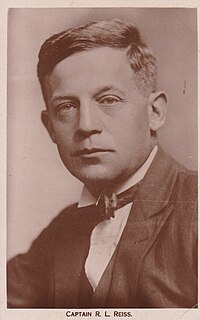Related Research Articles
Parliamentary by-elections in the United Kingdom occur when a Member of Parliament (MP) vacates a House of Commons seat during the course of a parliament.
The Darwen by-election, 1943 was a by-election held on 15 December 1943 for the British House of Commons constituency of Darwen in Lancashire.

The Combined Scottish Universities by-election, 1938 was a by-election held from 21 to 25 February 1938 for the Combined Scottish Universities, a university constituency of the British House of Commons.
The Cockermouth by-election, 1906 was a by-election held on 3 August 1906 for the British House of Commons constituency of Cockermouth.
The Westminster Abbey by-election, 1939 was a parliamentary by-election held on 17 May 1939 for the British House of Commons constituency of Westminster Abbey in London.
The University of Wales by-election, 1943 was a parliamentary by-election held in the United Kingdom between 25 and 29 January 1943 for the House of Commons constituency of University of Wales.

Sir William Pollard Byles was a British newspaper owner and radical Liberal politician.

Thomas Edmund Harvey, generally known as Edmund Harvey, was an English museum curator, social reformer and politician. He sat in Parliament, first as a Liberal and later as an Independent Progressive. He was also a prolific writer on Christianity and the role and history of the Society of Friends.
The Leeds North by-election, 1902 was a parliamentary by-election held for the House of Commons constituency of Leeds North in the West Riding of Yorkshire on 29 July 1902.
The Holderness by-election, 1939 was a parliamentary by-election held on 15 February 1939 for the British House of Commons constituency of Holderness in the East Riding of Yorkshire.
The Batley and Morley by-election, 1939 was a parliamentary by-election held in the United Kingdom on 9 March 1939 for the House of Commons constituency of Batley and Morley in the West Riding of Yorkshire.
Independent progressive is a description in the United Kingdom and elsewhere, to denote a political progressive, who lacks a formal affiliation to a party.
This was a parliamentary by-election for the British House of Commons constituency of Northampton.

The Bury St Edmunds by-election, 1944 was a parliamentary by-election for the British House of Commons constituency of Bury St Edmunds, Suffolk on 29 February 1944.
The 1902 Liverpool East Toxteth by-election was held on 6 November 1902 after the resignation of the Conservative MP Augustus Frederick Warr. The seat was retained by the Conservative candidate Austin Taylor.
The Skipton by-election, 1944 was a parliamentary by-election for the British House of Commons constituency of Skipton, Yorkshire held on 7 January 1944.

Orkney and Shetland is a constituency of the House of Commons of the Parliament of the United Kingdom. It elects one Member of Parliament (MP) by the first past the post system of election. In the Scottish Parliament, Orkney and Shetland are separate constituencies.
The Buckrose by-election, 1926 was a parliamentary by-election for the British House of Commons constituency of Buckrose, Yorkshire on 5 May 1926. This was the first by-election to take place during the General Strike.
The Popular Front in the United Kingdom attempted an alliance between political parties and individuals of the left and centre-left in the late 1930s to come together to challenge the appeasement policies of the National Government led by Neville Chamberlain.

Richard Leopold Reiss, was a British Liberal Party politician who later joined the Labour Party. He was Director of the Hampstead Garden Suburb Trust Ltd. He was awarded the Order of St Olav of Norway. In 1948 he was awarded the Howard Memorial Medal for outstanding services to town planning.
References
- ↑ "WHO'S WHO & WHO WAS WHO". WHO'S WHO & WHO WAS WHO.
- ↑ F W S Craig, British Parliamentary Election Results 1918-1949; Political Reference Publications, Glasgow 1949
- ↑ The Times, 23 March 1937 p16